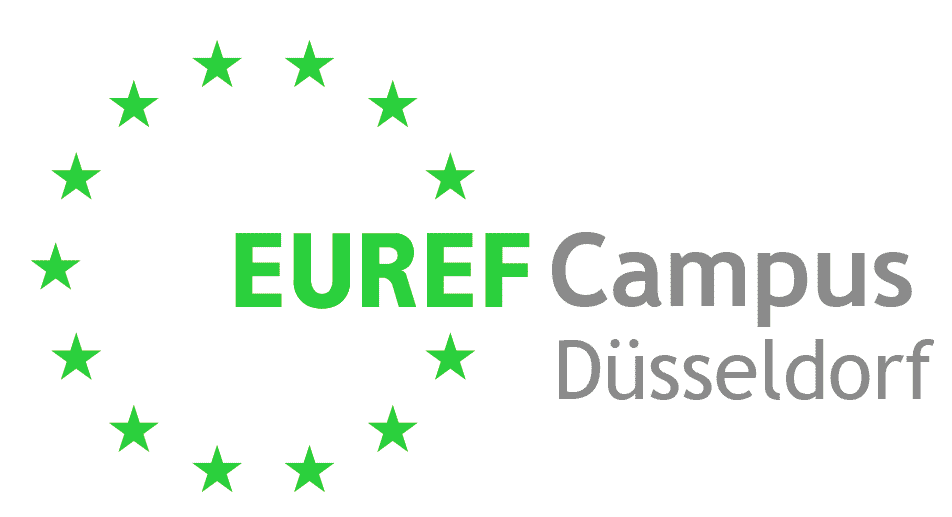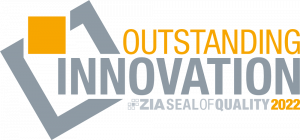INNOVATION PARTNERSHIP BETWEEN EUREF AND DÜSSELDORF AIRPORT
The sustainability network for the state capital and NRW
Munich/Düsseldorf, 4 October 2023 – More sustainability, more innovation, more cooperation: the EUREF-Campus and Düsseldorf Airport are establishing a network for green aviation and sustainable mobility. The companies announced this today at Expo Real. Priority fields of action of the innovation partnership are increased technological impulses for energy efficiency in the building sector and technologies for the decarbonisation of air and landside traffic, for example through the production and provision of sustainable aviation fuel (CO2-neutral paraffin). The projects of the innovation partnership are closely supported scientifically by the universities in the region represented in the EUREF Talent Campus.
In a joint press conference with Dr Stephan Keller, Lord Mayor of the state capital Düsseldorf, and Christophe de Maistre, Zone President Schneider Electric DACH, Lars Redeligx, CEO of the airport, and Karin Teichmann, CEO of EUREF AG, presented the joint sustainability network at the Düsseldorf stand at Expo Real.
“The EUREF-Campus Düsseldorf is still under construction, and yet we can already present a first pioneering innovation project today with this partnership,” explains Düsseldorf’s Lord Mayor Dr Stephan Keller. “This shows impressively what a great asset the campus will be for our region when the brightest minds in companies, start-ups and scientific institutions work together here from 2024 to develop future ideas for energy, mobility, environmental and climate protection.”
“We all know that the aviation industry must become part of the mobility transition if we want to achieve our climate protection goals,” says Lars Redeligx, CEO of Düsseldorf Airport. “We are delighted that we can continue to drive this topic forward right on our doorstep together with the EUREF community, contribute our expertise and create decisive synergies. This innovation partnership will make an important contribution to sustainability at the location and for the entire industry.”
“The conversion of air traffic to green fuels is a key issue for the future,” adds Christophe de Maistre, Zone President Schneider Electric DACH. “In this innovation partnership, we can provide comprehensive advice with our expertise in sustainable hardware, service and software solutions – for even more intelligence in buildings and in mobility.”
“Acting in partnership is a must if we want to achieve the energy and mobility transition in Germany. Close cooperation between business, science and politics in these areas is therefore part of EUREF’s DNA,” adds EUREF Board Member Karin Teichmann. “The direct neighbourhood to the airport and the operating company’s great willingness to innovate make it obvious in every respect to pool our expertise.
Together with the strong technology partners of the EUREF community, we are building a mobility hub for NRW at the airport’s long-distance railway station. In close cooperation with the state government of North Rhine-Westphalia and the city of Düsseldorf, we will also set important international trends.”
The EUREF-Campus Düsseldorf – innovative neighbourhood development with charisma
In the immediate vicinity of Düsseldorf Airport, EUREF AG is building another international showcase for the energy and mobility transition with the EUREF-Campus Düsseldorf, with a total gross floor area of around 105,000 m2. Sustainability and innovation in the fields of energy, mobility, climate and environmental protection are the cornerstones of the EUREF-Campus, which fulfils the highest energy standards from planning to operation and brings together start-ups, companies, associations and scientific institutions to form a synergetic community to develop new climate protection technologies. Together with tenants such as Schneider Electric, SPIE Deutschland & Zentraleuropa and the state company for energy and climate protection NRW.Energy4Climate, a vibrant future location for the energy transition is being created, which is exemplary thanks to a high-tech energy centre, the integration of the adjacent quarry pond into the thermal supply and the use of renewable energies. Four universities and colleges are involved in setting up and running the study programmes on the EUREF-Campus Düsseldorf: the University Alliance Ruhr with the Technical University of Dortmund, the Ruhr University Bochum and the University of Duisburg-Essen as well as the Düsseldorf University of Applied Sciences and Arts.
The first construction phase of the EUREF-Campus Düsseldorf will be ready for occupancy by October 2024, the second by mid-2025. The EUREF-Campus concept also includes event spaces for guests from politics, business and science as well as an extensive culinary offering with regional cuisine and bistros under the direction of top restaurateur Cornelia Poletto.
Düsseldorf Airport has climate protection firmly in its sights
Düsseldorf Airport is aiming to reduce CO2 emissions by 65% by 2030 in accordance with the targets of the German Airports Association. For Düsseldorf Airport, 65% means emissions of 20,713 tonnes of carbon dioxide in Scope 1 and 2. The airport aims to be climate-neutral by 2035 at the latest in line with the City of Düsseldorf’s target. From 2045 onwards, emissions are to be net zero.
The airport has implemented a large number of projects as part of these targets: In addition to two combined heat and power plants, the airport operates photovoltaic systems on the roofs of two aircraft hangars and an open-air system. The airport is connected to the city’s central district heating network and has been covering its externally purchased electricity requirements entirely with TÜV-certified green electricity since January 2022. The vehicle fleet is also being gradually converted to electric drives: 50 per cent are planned by 2030 and 100 per cent by 2045. Since 2012, the airport has been using an intelligent, predictive management system that not only provides the right room temperature everywhere and at all times, but also keeps an eye on the various energy sources available at the airport and thus controls energy consumption in a targeted, needs-based and cost-optimised manner in advance. In 2017, its use was extended to Pier A, where energy consumption has since been reduced by 22 per cent.


